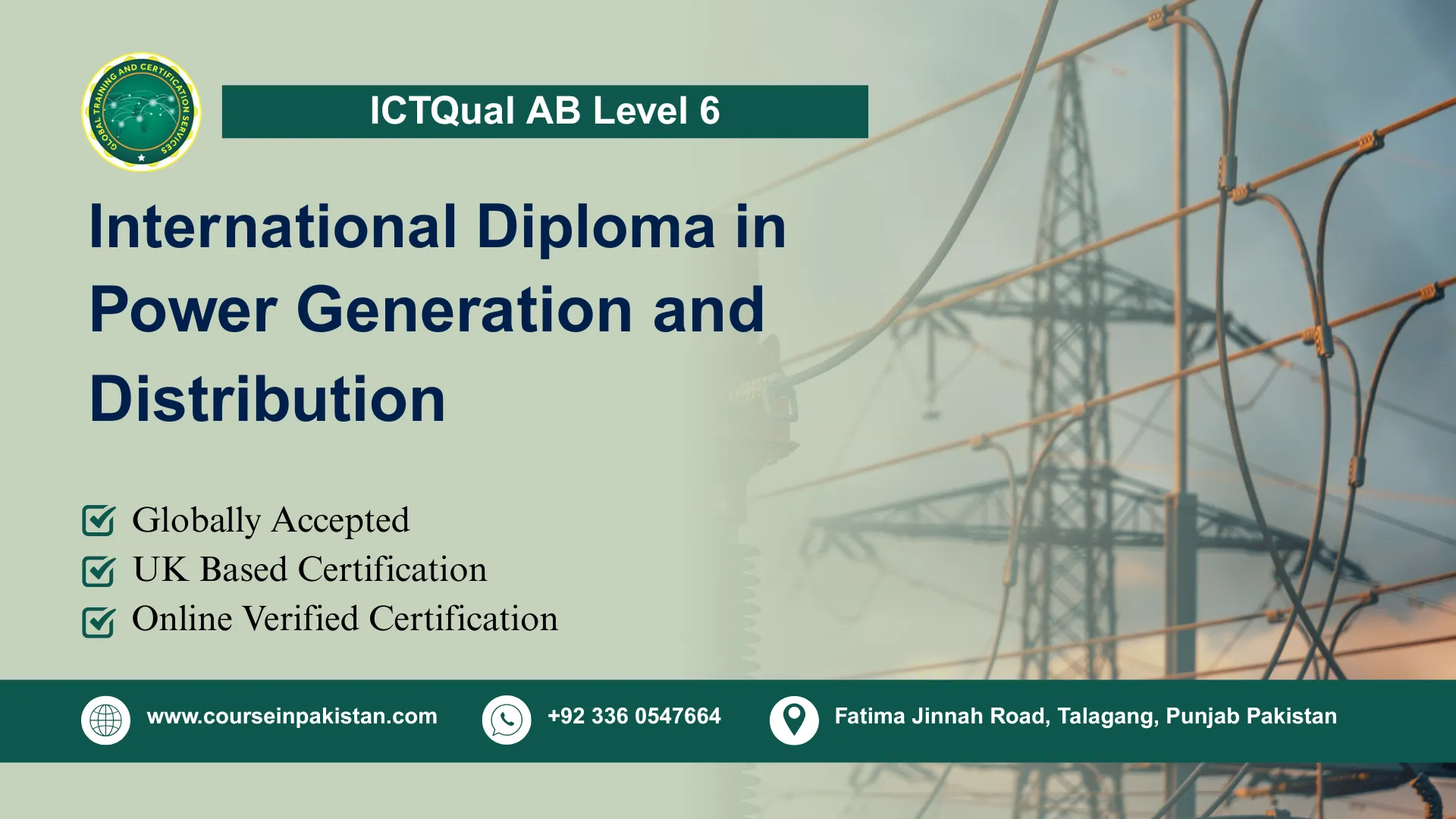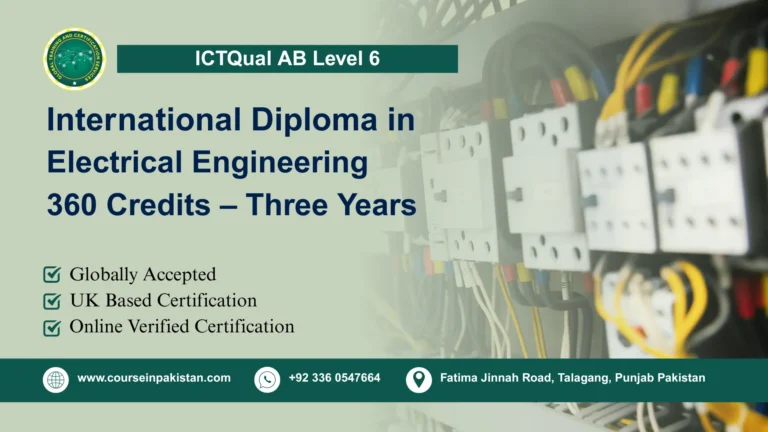
This diploma equips learners with the expertise to manage and optimize power generation and distribution projects efficiently. By integrating emerging technologies, automation, and energy efficiency techniques, graduates will be capable of implementing sustainable solutions to meet global energy demands. The course also emphasizes health, safety, regulatory compliance, and project management, ensuring that learners are well-prepared to tackle complex challenges in power systems worldwide.
The ICTQual AB Level 6 International Diploma in Power Generation and Distribution is designed to provide learners with advanced knowledge and practical skills in the generation, transmission, and distribution of electrical power. The course combines theoretical concepts with hands-on applications, covering conventional and renewable energy sources, power system design, and smart grid technologies. Learners will explore key aspects of electrical engineering, energy management, and sustainable practices in modern power systems, preparing them for leadership roles in the energy sector.
Course Overview
The ICTQual AB Level 6 International Diploma in Power Generation and Distribution is a globally recognized qualification designed to provide learners with advanced knowledge and practical skills in power generation, electrical distribution systems, energy management, and sustainable power technologies. This 360-credit, fully assignment-based diploma allows learners to study at their own pace from anywhere in the world. It is British Council verificable and MOFA and Embassy attestable, making it highly suitable for employment, career advancement, and iqama approval. The course covers key topics including electrical power systems, renewable energy integration, grid management, safety standards, and operational efficiency, equipping learners to handle technical challenges and lead projects in the power and energy sector.
This qualification is suitable for both fresh learners and experienced professionals. Fresh students are required to complete all 36 mandatory assignments within three years, while experienced and competent individuals with at least six years of relevant experience can complete the certification in a shorter time by submitting verifiable experience and defending their knowledge in professional discussion meetings with an ICTQual AB approved assessor, without completing all mandatory assignments. By the end of the program, learners will have developed the technical expertise, problem-solving skills, and strategic management capabilities necessary to take on leadership roles in power generation, energy distribution, and utility management, ensuring career growth and professional recognition in both local and international markets.
Key Highlights of the Course:
- In-depth study of conventional and renewable power generation technologies
- Advanced knowledge of electrical distribution systems and smart grids
- Practical skills in energy efficiency, system optimization, and project management
- Focus on health, safety, and regulatory compliance in power projects
- Preparation for leadership and strategic roles in the global energy sector
Course Benefits
Technical Expertise
- Gain advanced knowledge of power generation methods, electrical distribution, and smart grid systems
- Develop practical skills in system design, optimization, and troubleshooting
Project Management Skills
- Learn to plan, execute, and manage complex power projects effectively
- Apply project management principles to electrical systems and energy operations
Sustainability and Efficiency
- Understand energy efficiency techniques and renewable energy integration
- Implement sustainable practices in power generation and distribution projects
Leadership and Career Advancement
- Prepare for managerial and strategic roles in the energy and utilities sector
- Enhance decision-making, leadership, and problem-solving capabilities
Industry Relevance
- Align skills with global industry standards and emerging energy technologies
- Gain competencies required to meet modern energy challenges and demands
Course Study Units
This qualification, the ICTQual AB Level 6 International Diploma in Power Generation & Distribution, consists of 36 mandatory units.
Year 1 – Foundation in Power Generation & Distribution
- Principles of Electrical Power Systems
- Introduction to Power Generation Technologies
- Fundamentals of Thermal Power Plants
- Basics of Hydroelectric and Renewable Generation
- Electrical Machines and Circuit Theory
- Energy Conversion and Transmission Basics
- Health, Safety, and Environmental Awareness
- Power System Measurement and Instrumentation
- Laboratory Techniques in Electrical Systems
- Technical Report Writing
- Introduction to Power Simulation Software
- Energy Efficiency Fundamentals
Year 2 – Intermediate Power Generation & Distribution
- Advanced Thermal Power Plant Operations
- Renewable Integration in Power Systems
- Electrical Distribution Networks
- Grid Management and Load Analysis
- Power System Protection and Control
- Energy Storage and Backup Systems
- Process Control and Automation in Power Plants
- Energy Management Strategies
- Environmental Compliance and Sustainability in Power
- Quality Control and Assurance in Electrical Systems
- Project Planning and Technical Communication
- Data Analysis for Power Systems
Year 3 – Advanced Power Generation & Distribution
- Advanced Power Plant Optimisation and Troubleshooting
- Project Management in Energy Infrastructure
- Emerging Technologies in Power Generation
- Smart Grid Design and Integration
- Energy Storage Optimisation and Battery Technologies
- Risk Assessment and Hazard Analysis in Power Systems
- Advanced Laboratory Techniques and Field Testing
- Transmission and Distribution Network Planning
- Supply Chain and Logistics in Energy Operations
- Capstone Project in Power Generation & Distribution
- Professional Development and Leadership in Energy
- Strategic Decision-Making in Power Systems
Learning Outcomes
Year 1 – Foundation in Power Generation & Distribution
1. Principles of Electrical Power Systems
- Understand the structure and operation of electrical power systems
- Identify key components in generation, transmission, and distribution
- Explain the basic principles of power flow and system stability
2. Introduction to Power Generation Technologies
- Describe different methods of power generation (thermal, hydro, renewable)
- Compare the advantages and limitations of various technologies
- Understand the environmental impact of power generation methods
3. Fundamentals of Thermal Power Plants
- Explain the operation of thermal power plants
- Identify key equipment and their functions in a thermal plant
- Understand efficiency and energy conversion in thermal systems
4. Basics of Hydroelectric and Renewable Generation
- Describe hydroelectric power generation principles
- Explain the integration of renewable energy into power systems
- Assess the benefits and challenges of renewable energy sources
5. Electrical Machines and Circuit Theory
- Understand the functioning of transformers, motors, and generators
- Analyze basic electrical circuits using standard techniques
- Apply Ohm’s law, Kirchhoff’s laws, and circuit theorems in problem-solving
6. Energy Conversion and Transmission Basics
- Explain the principles of energy conversion in electrical systems
- Understand AC and DC transmission methods
- Identify factors affecting efficiency in energy transmission
7. Health, Safety, and Environmental Awareness
- Apply safety standards and best practices in electrical environments
- Understand risk assessment and mitigation strategies
- Recognize environmental impacts and compliance requirements
8. Power System Measurement and Instrumentation
- Use instruments for measuring voltage, current, and power
- Understand metering and monitoring in power systems
- Analyze data for system performance evaluation
9. Laboratory Techniques in Electrical Systems
- Apply practical lab techniques for electrical experiments
- Interpret experimental data accurately
- Maintain safety protocols in laboratory settings
10. Technical Report Writing
- Prepare clear and structured technical reports
- Present technical information using appropriate diagrams and charts
- Communicate findings effectively for professional audiences
11. Introduction to Power Simulation Software
- Operate software tools for power system simulation
- Model basic generation, transmission, and distribution scenarios
- Analyze simulation results to support system design decisions
12. Energy Efficiency Fundamentals
- Identify strategies to improve energy efficiency
- Assess energy consumption in generation and distribution systems
- Propose solutions for reducing waste and optimizing energy use
Year 2 – Intermediate Power Generation & Distribution
13. Advanced Thermal Power Plant Operations
- Analyze operational performance of thermal power plants
- Identify methods to optimize plant efficiency
- Implement troubleshooting techniques for operational issues
14. Renewable Integration in Power Systems
- Understand grid integration of renewable energy sources
- Assess impacts of variable generation on system stability
- Develop strategies for managing renewable power in the network
15. Electrical Distribution Networks
- Analyze design and operation of distribution networks
- Identify methods for improving reliability and efficiency
- Understand fault analysis and load management in distribution
16. Grid Management and Load Analysis
- Monitor and analyze electrical loads on the grid
- Apply techniques for demand forecasting and balancing
- Evaluate system performance under varying load conditions
17. Power System Protection and Control
- Understand protection schemes for generators, transformers, and lines
- Apply control methods for maintaining system stability
- Analyze fault scenarios and protective device coordination
18. Energy Storage and Backup Systems
- Describe energy storage technologies and applications
- Evaluate battery, flywheel, and other backup solutions
- Integrate storage solutions into power systems for reliability
19. Process Control and Automation in Power Plants
- Understand instrumentation and automation systems
- Apply control theory to plant operations
- Evaluate SCADA and PLC systems for process optimization
20. Energy Management Strategies
- Develop strategies for energy conservation and efficiency
- Analyze energy data for operational improvement
- Implement policies for sustainable energy management
21. Environmental Compliance and Sustainability in Power
- Understand regulations for emissions and waste management
- Apply sustainable practices in power generation
- Assess environmental impact of operations and propose mitigations
22. Quality Control and Assurance in Electrical Systems
- Implement quality standards and testing procedures
- Conduct inspections and audits for compliance
- Ensure reliability and safety in electrical systems
23. Project Planning and Technical Communication
- Develop project plans including timelines and resources
- Communicate technical information effectively
- Coordinate team activities and document project progress
24. Data Analysis for Power Systems
- Collect and analyze operational and performance data
- Use statistical tools for trend identification and forecasting
- Support decision-making through data-driven insights
Year 3 – Advanced Power Generation & Distribution
25. Advanced Power Plant Optimisation and Troubleshooting
- Identify methods for improving plant efficiency and output
- Apply advanced troubleshooting techniques
- Analyze operational data to optimize performance
26. Project Management in Energy Infrastructure
- Manage energy projects from planning to execution
- Understand budgeting, scheduling, and resource allocation
- Apply risk management strategies in energy projects
27. Emerging Technologies in Power Generation
- Evaluate new and innovative generation technologies
- Assess potential impacts on system performance and sustainability
- Explore applications of AI, IoT, and smart technologies in power
28. Smart Grid Design and Integration
- Understand smart grid concepts and architectures
- Integrate distributed energy resources into the grid
- Apply monitoring and control technologies for efficiency
29. Energy Storage Optimisation and Battery Technologies
- Analyze energy storage solutions for grid stability
- Optimize battery systems for performance and lifespan
- Integrate storage strategies with renewable energy generation
30. Risk Assessment and Hazard Analysis in Power Systems
- Conduct risk assessments for generation and distribution operations
- Apply hazard analysis techniques to prevent accidents
- Implement safety and mitigation plans
31. Advanced Laboratory Techniques and Field Testing
- Conduct complex experiments and field tests on power systems
- Use advanced measurement instruments and software
- Interpret results to support system design and improvement
32. Transmission and Distribution Network Planning
- Design transmission and distribution systems for efficiency
- Analyze load flow, fault scenarios, and network reliability
- Plan infrastructure upgrades based on demand forecasts
33. Supply Chain and Logistics in Energy Operations
- Manage procurement, transportation, and storage of materials
- Optimize logistics for cost and operational efficiency
- Apply best practices in energy supply chain management
34. Capstone Project in Power Generation & Distribution
- Execute a comprehensive project demonstrating technical expertise
- Apply theoretical knowledge to solve real-world energy challenges
- Present findings through a detailed technical report and presentation
35. Professional Development and Leadership in Energy
- Develop leadership and teamwork skills in energy environments
- Understand professional ethics and industry standards
- Plan personal career growth in the power generation sector
36. Strategic Decision-Making in Power Systems
- Apply decision-making frameworks to complex energy scenarios
- Analyze financial, operational, and environmental factors
- Make informed recommendations for system improvement
Who is This Course For?
Aspiring Power and Energy Professionals
- Individuals aiming to start a career in power generation, transmission, or distribution
- Learners motivated to work in energy utilities, renewable energy companies, or multinational power corporations
Engineering and Technical Graduates
- Graduates in electrical, mechanical, or energy engineering seeking specialization in power systems
- Individuals looking to gain practical and advanced skills in both conventional and renewable energy technologies
Industry Practitioners
- Professionals already working in energy, oil, gas, or industrial sectors seeking advanced knowledge in power systems
- Individuals aiming for career growth into operational, technical, or managerial positions in energy projects
Sustainability-Focused Learners
- Learners interested in implementing sustainable energy and energy efficiency solutions
Future Progression
- Progress to senior managerial or leadership roles in power generation, transmission, or distribution companies
- Specialize in renewable energy systems, smart grids, or energy storage technologies
- Engage in consultancy roles for energy optimization and sustainability projects
- Pursue higher academic qualifications such as a Master’s in Electrical Engineering, Energy Management, or Sustainable Power Systems
- Lead large-scale energy infrastructure projects in national and international conte
Academic Pathways:
- Master’s degree in Electrical Power Engineering or Energy Systems
- Advanced certifications in Renewable Energy, Smart Grid Technologies, or Energy Management
- Professional development courses in Project Management for Energy Infrastructure
- Research-focused programs in Sustainable Power Generation and Distribution
Conclusion
The ICTQual AB Level 6 International Diploma in Power Generation & Distribution equips learners with the technical knowledge, practical skills, and strategic leadership capabilities needed to excel in the dynamic energy sector. Graduates will be prepared to manage power generation and distribution systems efficiently, implement sustainable energy solutions, and lead complex projects in both conventional and renewable energy domains. This qualification ensures learners are industry-ready, capable of driving innovation, and contributing to the global transition toward sustainable and smart energy systems.




